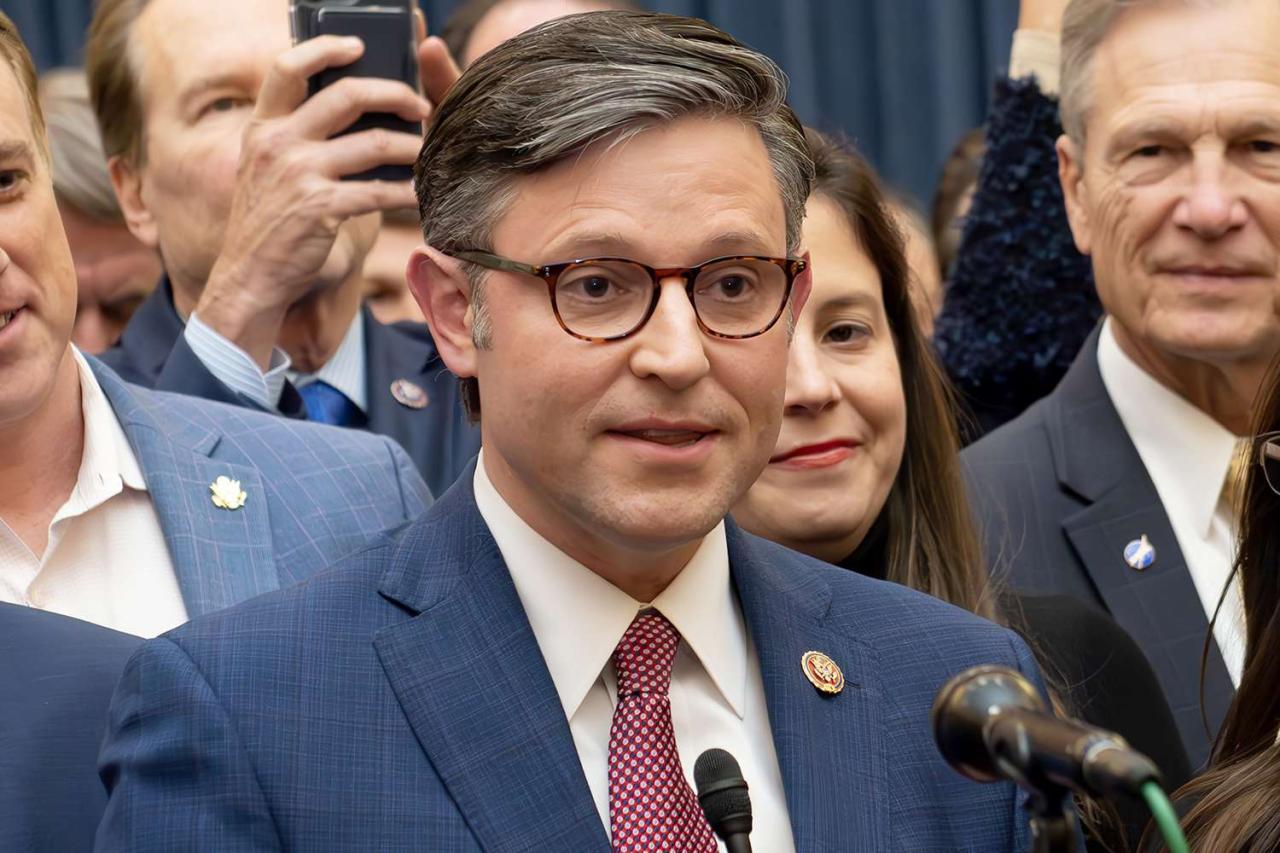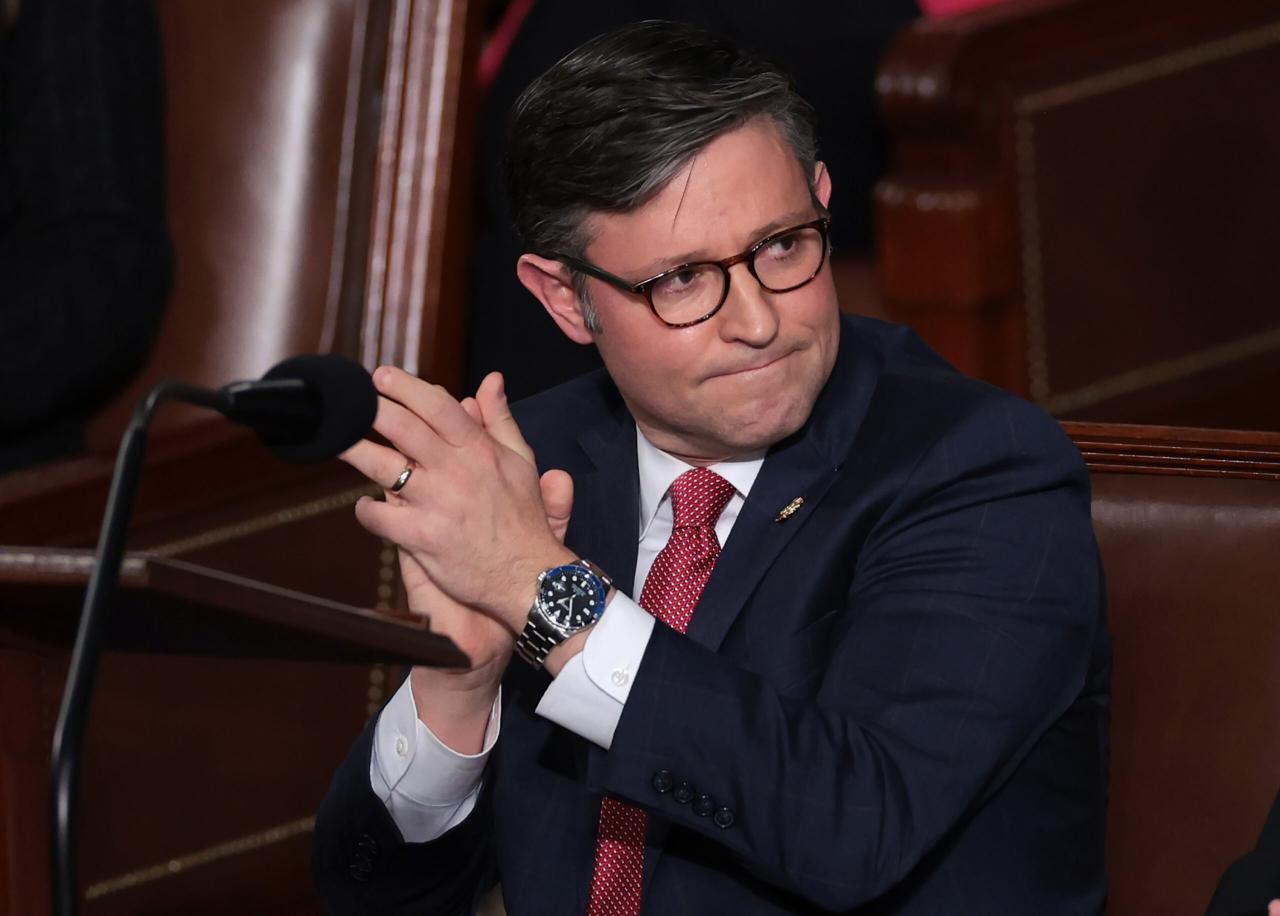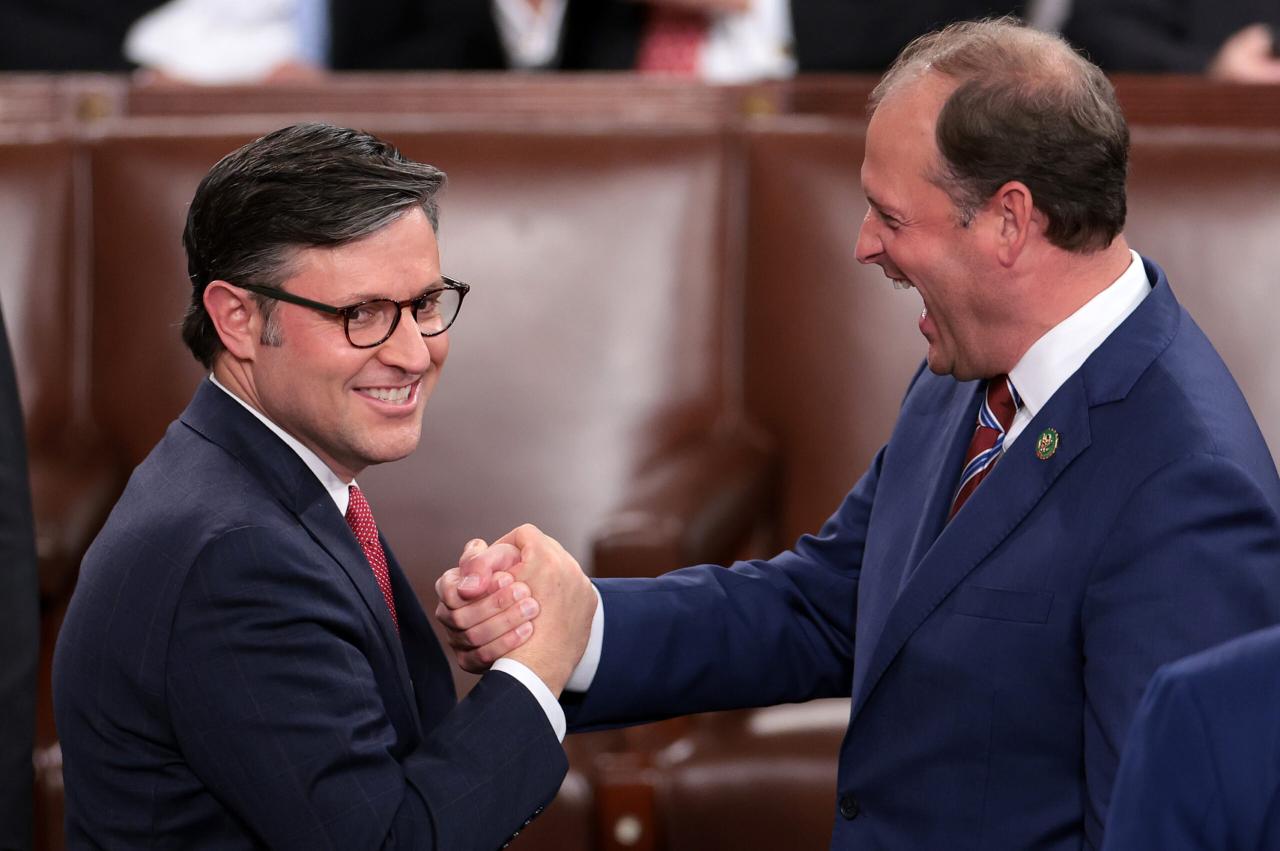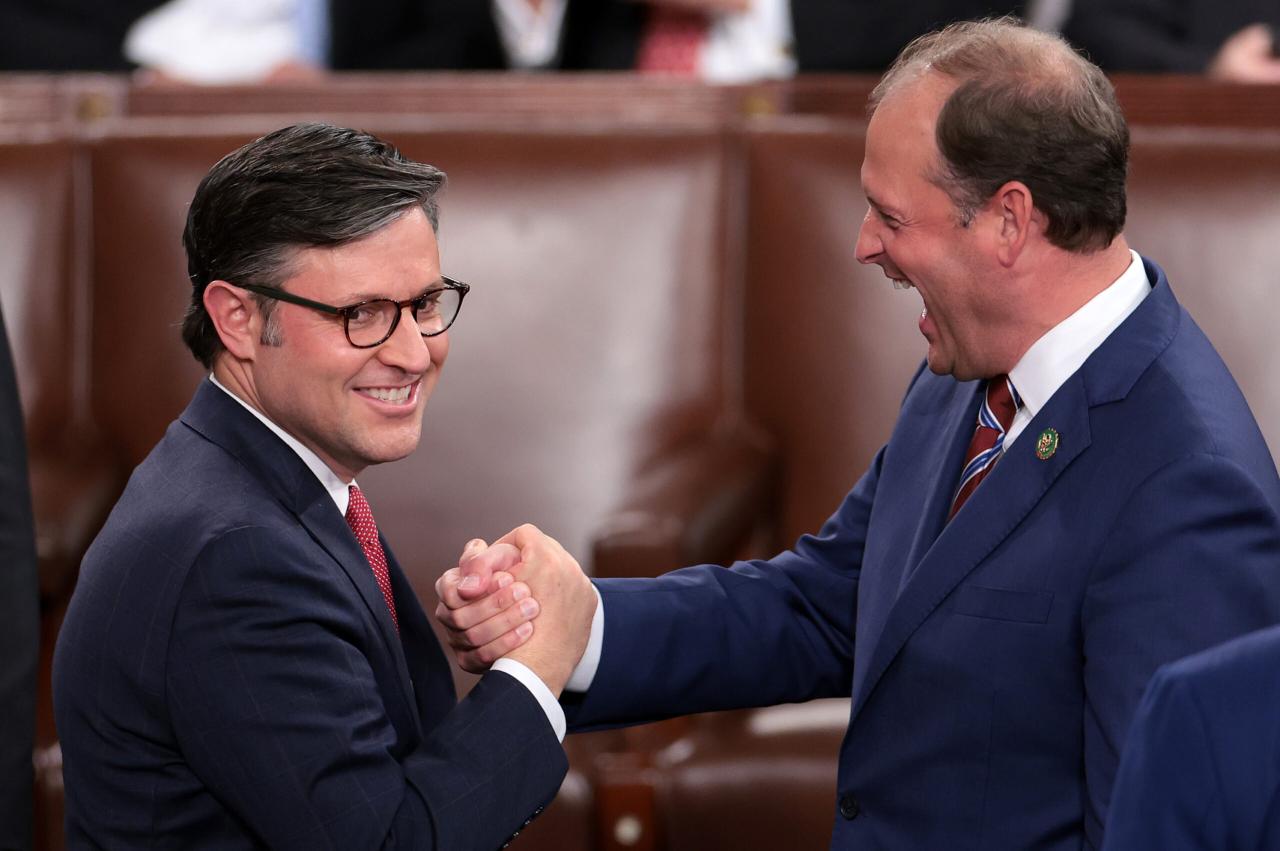États-Unis : Mike Johnson réélu à la présidence de la Chambre des represents a significant event in American politics. This re-election, following a potentially contentious process, has far-reaching implications for both domestic policy and international relations. We’ll explore the factors that led to Johnson’s victory, examining the political landscape, his challenges, and the likely consequences of his continued leadership.
Understanding the intricacies of this election requires analyzing the political climate preceding it, the key players involved, and the potential impact on various policy areas such as the budget, healthcare, and immigration. We’ll also delve into the public and media reaction, assessing the diverse perspectives and their implications.
So, Mike Johnson’s back as Speaker of the House in the US – big news stateside. Meanwhile, completely different news, but hockey fans should check out this update on the Canucks goalie situation: Canucks recall Arturs Silovs, Thatcher Demko remains out vs. It’s a pretty significant change for them, while the US political scene remains focused on Johnson’s reelection.
Mike Johnson’s Re-election as House Speaker: États-Unis : Mike Johnson Réélu à La Présidence De La Chambre Des

The re-election of Mike Johnson as Speaker of the House represents a significant event in American politics. This analysis examines the context surrounding his victory, its implications for domestic and foreign policy, the public and media response, and a closer look at Johnson’s leadership style.
Mike Johnson’s Re-election: Context and Significance
The House Speaker election unfolded against a backdrop of intense partisan division. Several factors contributed to Johnson’s re-election, including his ability to garner support from within his party and navigate the complex dynamics of a closely divided House. He faced challenges in unifying his caucus and securing enough votes, particularly given the potential for intra-party dissent. Comparing this election to previous ones reveals interesting trends in the length of the process and the shifting power dynamics within the House.
| Election Year | Number of Ballots | Major Contenders | Final Vote Count |
|---|---|---|---|
| 2023 | [Number of Ballots – Replace with Actual Data] | [List Major Contenders – Replace with Actual Data] | [Final Vote Count – Replace with Actual Data] |
| 2021 | [Number of Ballots – Replace with Actual Data] | [List Major Contenders – Replace with Actual Data] | [Final Vote Count – Replace with Actual Data] |
| 2019 | [Number of Ballots – Replace with Actual Data] | [List Major Contenders – Replace with Actual Data] | [Final Vote Count – Replace with Actual Data] |
Impact on US Domestic Policy
Johnson’s re-election will likely shape the legislative agenda for the remainder of the term. His leadership style and political positions will influence the prioritization and passage of key bills. His stance on budgetary matters, healthcare reform, and immigration will be pivotal in determining the legislative outcomes. For example, a conservative approach to the budget could lead to cuts in social programs, while a more moderate stance might result in bipartisan compromise.
- Potential for increased focus on [Specific Policy Area 1] legislation.
- Potential for gridlock on [Specific Policy Area 2] due to partisan divisions.
- Potential for compromise and bipartisan cooperation on [Specific Policy Area 3], depending on the political climate.
International Relations Implications

The Speaker of the House, while not directly involved in foreign policy decision-making, plays a significant role in shaping the overall political climate which influences international relations. Johnson’s leadership style and political leanings will affect how the US engages with other nations. Past Speaker elections have demonstrated that shifts in leadership can impact the tone and substance of international relations.
- Potential shift towards a more [e.g., isolationist or interventionist] foreign policy.
- Potential changes in the US’s relationship with [Specific Country/Region 1] due to Johnson’s stance on [Specific Issue].
- Potential for increased or decreased cooperation with international organizations.
Public Opinion and Media Coverage

Public reaction to Johnson’s re-election has been varied, reflecting the deep political divisions within the country. Media coverage has been similarly polarized, with different news outlets offering contrasting perspectives on his leadership and the election process itself. This analysis will examine the range of opinions and interpretations.
Hypothetical News Headline: “Johnson’s Re-election Signals Era of Gridlock and Partisan Warfare.” This headline reflects a pessimistic view, suggesting that his continued leadership will lead to political stalemate and hinder progress on crucial issues.
Johnson’s Leadership Style and Approach, États-Unis : Mike Johnson réélu à la présidence de la Chambre des
Johnson’s leadership style is characterized by [Describe his leadership style – e.g., collaborative, decisive, confrontational]. His approach to working with different factions within the House will determine the level of cooperation and legislative efficiency. Past decisions and their outcomes provide insights into his leadership effectiveness.
Visual Representation of Leadership Style: A central figure (Johnson) surrounded by smaller figures representing different factions within the House. The connections between the central figure and the smaller figures represent the strength of his relationships and his ability to build consensus. Strengths might be highlighted by strong, clearly defined connections; weaknesses by weak or absent connections, suggesting potential for conflict and division.
Final Review
Mike Johnson’s re-election as Speaker of the House marks a pivotal moment, shaping the trajectory of US domestic and foreign policy. The analysis presented reveals the complex interplay of political maneuvering, public opinion, and the potential consequences of his leadership style on both national and international stages. The coming legislative session will undoubtedly reflect the impact of this significant political event.
Q&A
What were the main criticisms of Mike Johnson’s leadership before this election?
So, Mike Johnson’s back as House Speaker in the US – big news! But hey, if you’re planning a weekend trip, check this out before you go: Winter storm warning issued for Kansas City, as weekend travel to might be tricky. Hopefully, the weather won’t impact any important votes happening back in Washington D.C.
with the new Speaker.
Criticisms varied but often focused on his stance on specific policy issues, his leadership style, and his ability to unify the House.
So, Mike Johnson’s back as Speaker of the House in the US – a pretty big deal. However, things got a bit chaotic when, as you may have heard from this news report, Rep. Virginia Foxx injured outside House chamber in Capitol building , creating some extra buzz around the whole event. It’ll be interesting to see how this affects Johnson’s agenda going forward.
How long is Mike Johnson’s term as Speaker?
The term is typically for two years, coinciding with a congressional session.
What is the role of the House Speaker in US government?
The Speaker presides over the House of Representatives, influences the legislative agenda, and is a key figure in the party’s leadership.
What are some potential challenges Johnson will face during his second term?
Challenges include maintaining party unity, navigating legislative gridlock, and addressing pressing national issues.
